| Jimi Hendrix Bought
Our Cooker. Continued |
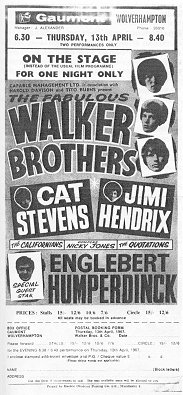
Gaumont Bill.
We will never see the like again. The Californians
managed to get on to one of the most extraordinary bills
of all time. How could Jimi Hendrix and Engelbert
Humperdinck possibly appear on the same bill, but they
did. (Mel Brookes) |
The road manager
for the group at that time was Mel Brookes
(Mick's brother) and he recalls after the show at the
Gaumont in Wolverhampton:
"After the
show at the Gaumont, everybody went down to the
Kingfisher and jammed together. Jimi Hendrix was up on
stage with Roger Allen and the other lads. Roger knew
Noel Redding from Germany when he was with the Loving
Kind. I bet there aren’t many people who realise that
Jimi Hendrix played the Kingfisher in Wall Heath."
"I held on to
the programme from that tour and it had Jimi Hendrix’s
autograph on it. I contacted Christie’s and asked them
about the value of the programme. It fetched something
in the region of 700 quid. We used it to buy a new
cooker, so I can genuinely say 'Jimi Hendrix bought our
cooker! The best part of it was that my mother later
found an autograph book which also had Jimi Hendrix’s
autograph and the others from that tour."
Recording contracts and
participation on national package tours brought a
greater likelihood of media appearances and
performances. All of the more successful local groups
appeared a number of times on several of the BBC's 'pop'
radio programmes, firstly on the Light Programme and
later on Radio One. Those same groups also appeared on
the 'pirate' radio stations, especially Radio Caroline.
It might be expected that the BBC
would possess equipment far superior to anything
possessed by the groups. Mel Brookes gives a
different impression: |
|
"The
Californians did many recordings for BBC radio
programmes, like Jimmy Young, David Symonds etc. The
Musicians' Union demanded that the music was live so the
lads would go along one morning and record about five
numbers which could be played throughout the week. The
recording was done at Walker Hall which was housed in a
former school. It still had recording equipment from
about 1947 which hardly compared favourably with the
equipment that the Californians' owned. Walker Hall was
replaced by Pebble Mill, I think."
Keith Evans
remembers recording many radio programmes, although he
feels that the Californians were not the major local
group to be heard on radio:
"We did quite
a number of radio programmes like Pop North, Saturday
Club with Brian Matthew and Monday Monday but we never
did anywhere near the same amount of radio as the
Montanas. They were on radio far more often than us. But
they were definitely the most successful of the local
groups, at least in terms of their sound being more
appropriate to radio. They ultimately became the ideal
Radio Two group, I suppose."
If the
Montanas were the ideal Radio Two group, it was on
Radio One that they made their radio appearances, as
Johnny Jones remembers:
"When groups
first set out, their main objective is to record and
gain record success. The majority of records do not get
into the charts but several are successful in a
different way, they are airplay hits. That means that
the record is played a great deal on radio. We made a
few airplay hits and as a result we got to do a number
of appearances on radio programmes like David Symonds,
Saturday Club, Easybeat etc. We did so many that we
became almost blase about it all."
Dan Robinson
reckons that Herbie's People did about 36
broadcasts on radio. The majority were on BBC (Light
Programme or Radio One), while others were on Radio
Luxembourg or 'pirate' radio:
"Appearing on
radio became quite commonplace. We did about 36
broadcasts in all. That included most of the popular BBC
programmes of the time like Saturday Club which seemed
to be listened to by the vast majority of the younger
adult population. We did at least one live broadcast
from Wolverhampton for Radio Luxembourg. I think it was
the Cadbury’s Lucky Numbers Show."
"We appeared
on TV on shows like the Golden Shot with Bob Monkhouse
which was recorded in Birmingham at ATV Studios. The
group was just required to perform their latest record.
That used to go out on a Sunday afternoon. We were on
early evening programmes like Five 0 'Clock Club as
well. It was one of those programmes designed for
youngsters and the group would be on to add a little pop
music."
Len Beddow
found working on radio a real pleasure:
"It was the
people involved, they were all so very nice. When we did
Saturday Club, Brian Matthew was a really nice bloke.
The programme had to be a single taping, no double
tracking or anything like that. It was all on one roll
and had to be done quickly. The professionalism of the
people involved meant that it worked most times very
well."
"It was interesting that Brian
Matthew took the time out on one of his Sounds Of The
Sixties programmes to relate the whole story behind our
recording of Semi-Detached Suburban Mister Jones and the
controversy surrounding it. As I said he was a really
nice bloke." |
| It was not just in Britain that
local groups appeared on radio or TV, they also managed
to appear on the broadcasting services of other European
countries, especially when they were playing in those
countries.
For example, groups like the
Black Diamonds, Californians and
Montanas could be heard in Germany, the Ebonies
(Wolverhampton's first successful black group) were
heard in Denmark where they were very successful and
Light Fantastic made a 'dynamic' and somewhat
'memorable' appearance on RTE in Ireland. |
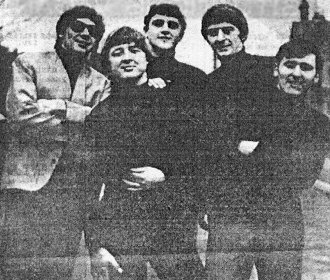
Herbie's
People. The group strike a
typical pose for the newspapers. The shades are a perk
of the job! (Len Beddow) |
|
Light
Fantastic was renown as a
group because of the individuality of their stage act.
Their lead singer was the outstanding Roy Dripper
Kent but it was the 'horror' features of the act
which is particularly remembered by fans. The Express
& Star described the act as follows:
'Light
Fantastic produced a show which had the girls rushing
away from the stage rather than towards it. It was
caused by their special rendition of Monster Mash, which
involves a real monster, in the form of bass player Ron
Dickson. He leaps about in the audience and looks enough
to scare the living daylights out of anyone, including
Boris Karloff. He threatens girls with blood running
from his mouth, smoke and flames belching out from under
his cloak. He can create near panic and mayhem. In the
year since the act started about 40 girls have fainted.'
|
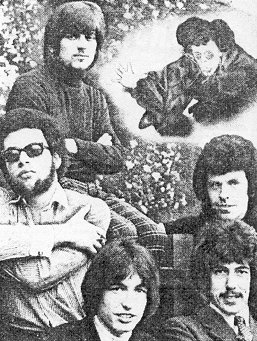
Light
Fantastic. The most
outrageous of all the local groups. Their Dracula act
(Ron Dickson) was superb and was responsible for several
nasty turns. |
It was this act
which the group took to Ireland to appear on RTE's
Like Now (equivalent to BBC"s Top Of The Pops).
They were booked for a Halloween special. RTE hired a
coffin for Ron Dickson to use and arranged for
him to have monster finger nails and fangs. They even
insured the studio audience for heart attacks. The act
was even discussed on an adult discussion programme
called Talkback. Apparently the majority opinion
was that the act was sacrilegious and obscene. It was
still deemed to be a great success.
Requests for
live appearances by many local groups increased from
venues further and further afield, especially from those
clubs, ballrooms and agencies with links and reciprocal
agreements with the Astra Agency in Wolverhampton. It
became quite usual for Wolverhampton groups to start
appearing in Scotland, the South West, Yorkshire, the
East Midlands, Manchester and all other points west!
While such arrangements increased as the decade
continued, it had been happening almost from the start
of the group scene, as George Maddocks describes:
|
|
"The
Strollers had not really been together that long when we
were offered the opportunity to do a fortnight on the
South Coast accompanying an up and coming singer called
Paul Raven. He was to become somewhat better known as
Gary Glitter some years later. He expected a big rounded
sound, something like Tommy Burton, so he was none too
impressed with a simple four piece like us. Still, it
was good experience. It was arranged by Astra and a West
Country agent called Lionel Digby."
One venue which
became quite a common port of call for Wolverhampton
groups was the 400 Ballroom in Torquay. It was at the
400 that the 'new' 'N Betweens really came
together, as Jimmy Lea tells us:
"The booking
at the 400 Ballroom was made before the group changed.
It had become an arrangement between Astra and the 400
that local groups went down there. Steve Brett and the
Mavericks had done it before us. The management from the
400 demanded that John Howells sang with the group. It
was great because at least it meant that we had a
guaranteed week’s work."
"It was
during that week that we were able to work on things
because John did not perform the one night when we went
to play in Plymouth. It was in Plymouth that we decided
that Noddy was ideal as the group singer. By the time we
had finished doing the 400 over the next few years we
had become the most booked group there, beating the
record of Dave Dee and the Bostons (later Dave Dee, Dozy
etc.). We were there in the flower power and the
skinhead days."
The 400 Ballroom
was played by most of the Wolverhampton groups during
the second half of the decade, as was a number of other
venues in the South West. |
|
Once again
Jimmy Lea
recalls a time when the group was playing in Newquay:
"It was while
we were playing in Newquay that we first came into
contact with an up and coming group called Queen. Roger
Taylor told me that they used to sneak in and check out
our equipment because they really liked the sound we
were making. They couldn’t believe it when they found we
just had AC 30 amps, although we did have treble
boosters." |
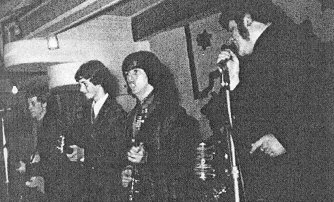
|
'N Betweens.
One of the last times Johnny Howells sang
with the group. Notice Jimmy Lea and Noddy
Holder on guitars. (John Howells) |
|
| The involvement of the Astra
Agency inevitably meant that the more successful local
groups spent an increasingly smaller amount of time in
the local area, as Graham Gomery
describes: |
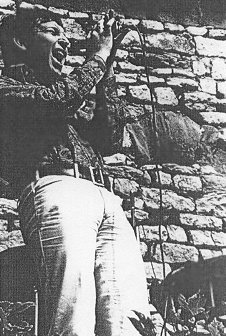
Graham
Gomery. Lead singer with
the Soul Seekers letting rip. He was one of the best
examples of a lead singer moving with the times, from
the rocking Dane Tempest to the soulful front man.
(Graham Gomery) |
"When we
became the Soul Seekers and changed from Graham Walker
to Maurice Jones as our manager, we became part of the
rapidly growing Astra 'empire' which seemed to extend in
some way all over the country. We got to play in a wide
variety of venues, stretching from London, Scarborough,
Nottingham, Sheffield, Manchester etc. There did not
seem to be any area or region where Astra did not have
some sort of link."
"It was all
very exciting for us. We were still young and there we
were travelling extensivel, getting paid reasonably for
something we loved doing. We were getting to meet a wide
variety of pretty interesting people as well."
Dan Robinson
does not feel that it was necessary to have links with
Astra to secure success:
"We did a lot
of work for other agencies, other than Astra. We worked
for Nita Anderson and for Terry Matthews in Walsall,
both women had quite a number of close links with some
pretty good venues. We did some work for Roger Allen
also. He was a good bloke." |
|
"In the later
60s we played on the college and university circuits
which really developed from about 1966. We got to play
alongside a lot of really good groups and were always
able to give a really good account of ourselves. I
remember us playing King’s College in London with the
Animals and getting a much better reception than they
did."
Another group
which played quite regularly on the college circuit was
Varsity Rag (not too much of a surprise,
considering the name). The lead guitarist with the group
was Brian Nicholls:
"We realised that one of the
big growth areas was the university and college scene so
we opted for a name which we hoped would open some doors
for us. It worked reasonably well and we got to play at
a lot of colleges. That scene was one of the most
lucrative during the last few years of the 60s." |
|
"One
development which I feel probably came out of the
college and university circuit was the all-nighter which
involved a number of groups playing throughout the
night.
The groups
often varied in style and nature so that they could
attract a wide audience. It was rather like the festival
idea but indoors. We played in a few all-nighters at
places like Bingley Hall."
|
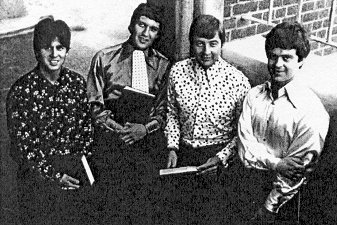
Varsity Rag.
The group used their name to open college gates, a very
enterprising idea! (Brian Nicholls) |
|
The Soul
Seekers was another group that played at a number of
these events, although it was not without some cost to
the group, as Roger Bromley explains:
"The image of
the group underwent a number of changes, especially in
sound and appearance. We had gone through the suits, to
the leathers, to the hippified appearance and some of
the lads found the changes too much, especially when the
all-nighters began. We were getting older, some of us
had steady girlfriends, if not wives, and we were
entering into the mortgage stakes. As a result a couple
of the fellers left the group."
"We started
to play venues like the Casino in Walsall or the Twisted
Wheel in Manchester. Often the gig went on into the
early hours and we were often getting back home around
breakfast time, if not later. All in all such a schedule
was too much for some of the group to take. It was
probably such things which started to undermine the
group’s solidarity and ultimately led to the demise of
the group and the onset of firstly Cross-Cut Saw and
then later, Travelling Redwing."
The London club
scene had become the focal point for popular music and
most of the other features of the 'Swinging Sixties'
scenes during the second half of the decade and so it
was hardly surprising that most of the groups saw the
opportunity to play at any of the 'major' London clubs
as a very significant step on the road to stardom. For
one local group it certainly was significant, as
Jimmy Lea recalls:
"Having met
Jack Baverstock, changed our name to Ambrose Slade and
joined Fontana, it was felt that we should have a London
management. Jack arranged for John Gunnell to come and
see us at Rasputin s club. It was there that we first
met Chas Chandler who was to become our manager and
become responsible for a whole series of changes which
ultimately led to us becoming a No.1 band."
When Zyder
Zee released their first record Soul An
Inspiration it was recorded at CBS Studios in London
and the group stayed in the capital for some time while
they plugged it. Their stay included appearances at some
of the London clubs, as Clive Mountford tells the
story:
"The
recording was done at CBS and was supervised by Keith
Richard and Bill Wyman from the Stones, which in itself
was a fantastic experience. The record was quite good
rendition of the number and came out a week before the
Righteous Brothers' version. Ours was reasonably
successful, making the Radio Caroline charts."
"We stayed
down in London for a few weeks, trying to plug the
record on Radio Caroline and in the clubs which we got
to play. My most vivid memory of a London club was Tiles
in Oxford Street. It was one of the very popular nd in
places of the time. It does not exist any longer but as
featured regularly on a German TV programme called eat
Club."
"While we
were not earning too much, the important thing was to
get to know people and get your face known. We would
spend time in the clubs, drinking water from a glass,
pretending it was gin or vodka. The more people you knew
the better or so it seemed.Talent was all very well, but
it was a wonder how much could be achieved by personal
contacts."
Varsity Rag
played at another of the more famous London clubs,
Scotch of St. James, as Brian Nicholls describes: |
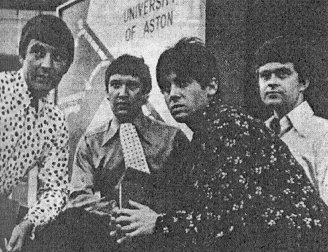
|
Varsity Rag.
The University of Aston was just one port of
call on the group's higher educational
circuit. (Brian Nicholls) |
|
"It was quite an exclusive
occasion of some kind. It was held in the courtyard of
the Scotch of St. James. We were there alongside a
number of quite well-known groups. I lapped it up,
although the prices of the drinks were so astronomical
that we had to smuggle booze in via the amplifiers.
Once you did your set, they
wanted you out of the way as soon as possible. We
actually mingled with the crowd and enjoyed it. Mick had
been most put out by being virtually asked to leave." |
 |
 |
 |
Return to
the
previous page |
Return to
the Contents |
Proceed to
the
next page |
|